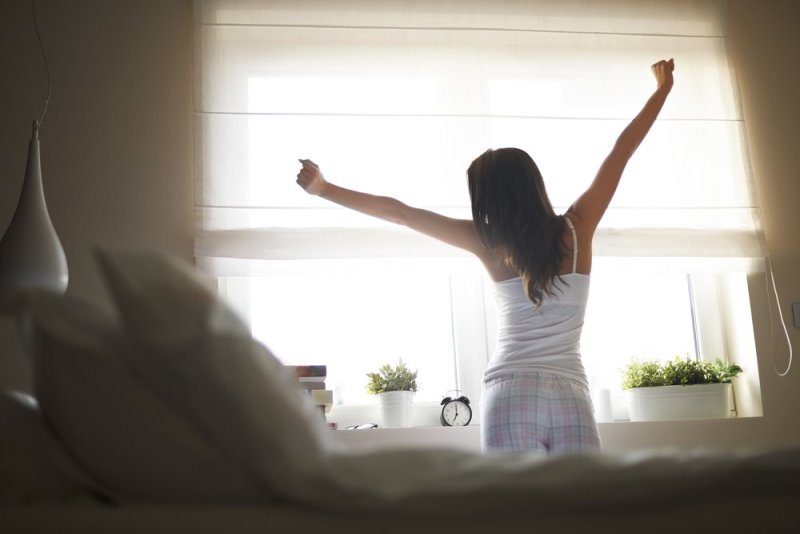If you’re like most people, you struggle to get out of bed in the morning. Maybe you hit the snooze button 10 times before finally forcing yourself out of bed, or maybe you mess around on your phone, repeatedly checking social media because you can’t convince yourself to get out from under the covers. True, natural morning people are out there… but you might be surprised that some of the perkiest of them all were once just like you, until they learned once and for all how to show their alarm clock who’s boss. Believe it or not, you could be just like them someday. All it takes is a little discipline and the ability to find a routine that works for you and stick to it.
Get More Sleep
It may sound obvious, but one of the best things you can do for yourself in your mission to get up earlier is just get to bed sooner! That way you wake up better rested! Depending on your age and your genetic predisposition to hours needed, you may require a full 8 hours but it may vary depending on your body. A great way to determine how many hours your body actually needs is to use a sleep tracking app to average out your hours over time.
Don’t Hit Snooze!
Sleep experts agree that hitting snooze is bad for sleep and disrupts the body’s natural sleep cycles, making you even groggier than if you’d just got out of bed the first time. While sleeping, your body alternates between light and deep sleep. About an hour before your body wakes itself up, your brain begins to “reboot”, sending out signals as you enter into a lighter sleep in preparation to wake up. It’s much more beneficial to your body to cash in on longer deep sleep, rather than constantly interrupting sleep by disrupting it with the snooze button. Furthermore, repeatedly hitting snooze morning after morning trains your brain to think of the alarm sound as a “roll over and go back to bed” sound, rather than a “time to get up” sound. To minimize the use of your once-beloved snooze button, set your alarm for the last possible minute (the latest time you’d normally hit snooze) instead of setting it a little earlier with a plan to snooze eight times.

fizkes/Shutterstock
Prepare For Your Morning The Night Before
One of the reasons it can be hard to get out of bed is that from the minute your eyes open, you’re already annoyed with just how much you have to do to fulfill your morning routine. A great way to combat this if you’re a night owl trying to become a morning person is to use that energy you have in the evenings to prepare for the morning and make it easier on your morning-self. You’d be surprised by how much easier it is to greet the day when you know you’re starting it off stress-free. Try preparing your lunch the night before, packing your work bag, backpack, and/or gym bag in advance, or using an auto-brew coffee maker with a timer so you’re motivated to hop out of bed knowing there’s a fresh cup of coffee already waiting for you in the kitchen.
Wake Up To Natural Light
Humans are naturally wired to wake up to natural light, but the demands of modern life make it difficult to stay on nature’s schedule. No matter how bright the lights are in your home or office, humans are genetically predisposed to needing more. To put this into perspective, the natural sunlight of an overcast day in Europe provides 10,000 lux (units of light), while a standard school or workplace only supplies between 200-500 lux. So while it may be painful at first, leaving those curtains or blinds wide open and letting in the morning light is one of the best things you can do for your mornings and for your internal clock. If your schedule requires you to wake up before the sun or the windows in your room aren’t great, try out a natural light alarm clock that will slowly build up the light in your room to mimic the rising sun.

Stokkete/Shutterstock
Unplug And Unwind Before Bed
Distractions like cellphones, TVs, and laptops produce unnatural light, which affects your body’s ability to produce melatonin ("the sleep hormone"), and interferes with your body’s circadian rhythm. This, in turn, prevents deep, restful sleep, makes it even harder for you to get up in the morning, and is actually linked to stress and depressive symptoms. You will find it much easier to fall asleep if you get used to sitting or lying in dim lighting (away from any glowing screens!) ahead of your bedtime. Instead of reading off a lit display before bed, do activities that promote sleepiness, like reading off print pages or taking a warm bath in low lighting.
Form Habits
As basic as it may sound, the best thing you can do to become a morning person is establish a routine and stick to it. Not only do our bodies respond well to habits, but our sleep cycles operate according to biologically-driven clocks that can generally be programmed over time to wake up around the same time range every day, eventually without the help of an alarm. Do yourself a favor and structure your mornings into a series of habits that you can reliably get used to performing. Wake up and immediately do some stretches (or – as crazy as it may sound – some cardio!), practice a new activity you’ve been trying to master, or just get your mind psyched for that first cup of coffee every day at the same time.
